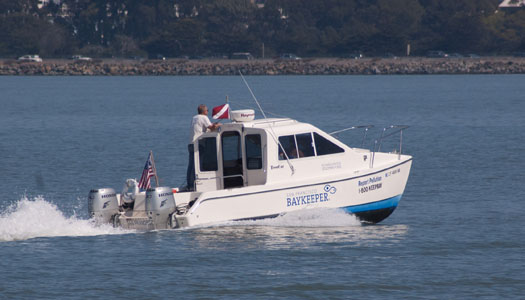As we patrolled the southern San Francisco shoreline in the Baykeeper boat, we glided toward a huge facility where paint was being sandblasted off a massive ship towering above us. Paint chips blew onto our deck.

Baykeeper patrols San Francisco Bay by boat to find and stop pollution. Photo by Sejal Choksi-Chugh/San Francisco Baykeeper
By Deb Self
Published: May, 2013
As we patrolled the southern San Francisco shoreline in the Baykeeper boat, we glided toward a huge facility where paint was being sandblasted off a massive ship towering above us. Paint chips blew onto our deck. Looking down, we saw a swirling film of pinkish-gray dust floating on the Bay’s surface.
Geoff Potter, our volunteer skipper that day, maneuvered closer. We rocked slightly on low waves. Baykeeper staff scientist Ian Wren hung over the boat’s side as he reached down and scooped up samples of the polluted water for analysis at a lab.
We also took photos showing that the dust came from BAE, a multi-national defense contractor that repairs oil tankers, cruise ships and other large vessels at the West Coast’s largest dry dock.
Lab testing of the water we collected revealed toxic heavy metals at 20,000 times the legal pollution standard. Baykeeper sued BAE, and the company quickly worked with us to identify new pollution controls. BAE then signed a legally-binding agreement to make upgrades to the site to protect the Bay from that pinkish-gray dust and other contamination. Among the controls BAE has installed, when ships are being sanded, a giant tarp now keeps toxic paint chips and dust from blowing into the Bay.
While most people take their boats out on San Francisco Bay to find beauty, Baykeeper also sets out to find ugly. No local government agency searches for pollution from a boat in the Bay. Our small nonprofit organization has filled this role for close to a quarter-century.
"There are certain things you can only see from the water," said Robert Fairbank, another Baykeeper volunteer skipper. Currently, Baykeeper is working to stop pollution from two shoreline industrial sites that store huge piles of toxic materials outdoors. Wind and rain carry dust from those sites into the Bay. "But we couldn’t see that from land," Fairbank said. "That’s why it’s important that Baykeeper has a boat."
In 2007, when the Cosco Busan oil tanker hit the Bay Bridge and spilled 53,000 gallons of oil into the Bay, we were there in our boat within hours. We reported that the spill was much larger than officials had reported and called for more cleanup resources. As the disaster unfolded, we took the media by boat to document the damage to the Bay shoreline and wildlife, so the public could be informed.
Later, the information we’d discovered on the water helped lead to new laws requiring a faster and more effective response if oil is spilled in the Bay, and better practices to prevent oil spills. A recent example is the new rules that keep large outbound ships from passing under the Bay Bridge in heavy fog.
Baykeeper’s volunteer skippers make a huge contribution to our boat patrols. They all have years of prior boat experience. Head Skipper Geoff Potter not only pilots our boat on some patrols, he handles all engine and hull maintenance and repairs, plus he selects and trains our skippers. Potter said, "I’ve spent most of my life on the water, and I’m really into protecting the water environment. By volunteering for Baykeeper, I get to do two things I love at once."
Several times a month, we patrol the San Francisco and East Bay shorelines, watching for signs of illegal pollution. Other days, we may cruise Raccoon Strait, looking for signs of ecological health—including the migratory birds, sharks, and marine mammals drawn by a good herring run. See you on the water, as we work to make San Francisco Bay cleaner and healthier from the Baykeeper patrol boat.
Deb Self is Executive Director of San Francisco Baykeeper, www.baykeeper.org. Baykeeper uses on-the-water patrols of San Francisco Bay, science, advocacy, and the courts to stop Bay pollution. To report pollution, call Baykeeper’s hotline at 1-800-KEEP-BAY, e-mail hotline@baykeeper.org, or click "Report Pollution" at www.baykeeper.org.

